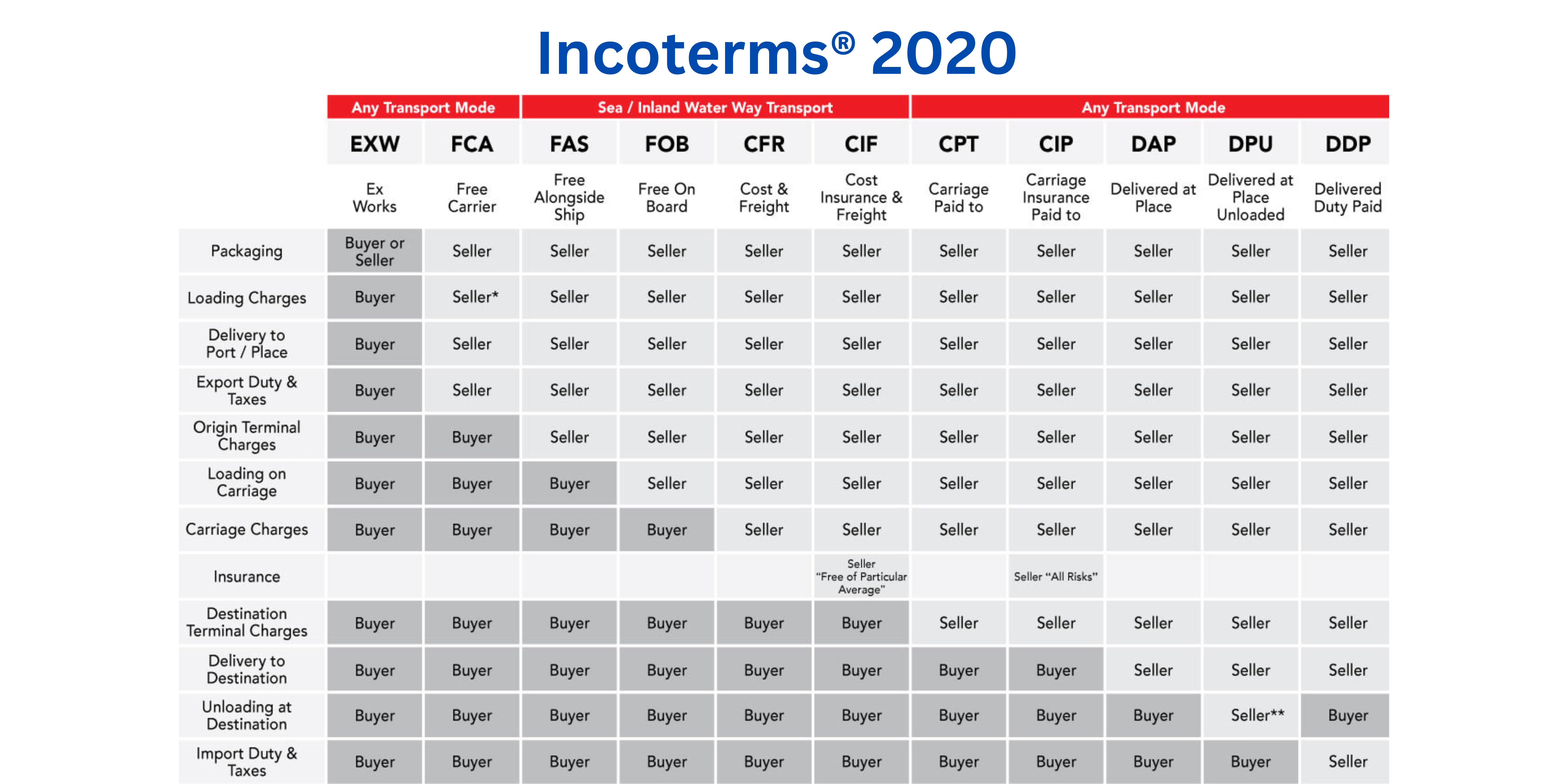
Rules for any mode or modes of transport:
EXW - Ex-Works or Ex-Warehouse
“Ex Works” means that the seller delivers when it places the goods at the disposal of the buyer at the seller’s premises or at another named place (i.e., works, factory, warehouse, etc.). The seller does not need to load the goods on any collecting vehicle, nor does it need to clear the goods for export, where such clearance is applicable.
FCA - Free Carrier
“Free Carrier” means that the seller delivers the goods to the carrier or another person nominated by the buyer at the seller’s premises or another named place. The parties are well advised to specify as clearly as possible the point within the named place of delivery, as the risk passes to the buyer at that point.
CPT - Carriage Paid To
“Carriage Paid To” means that the seller delivers the goods to the carrier or another person nominated by the seller at an agreed place (if any such place is agreed between parties) and that the seller must contract for and pay the costs of carriage necessary to bring the goods to the named place of destination.
CIP - Carriage and Insurance Paid To
“Carriage and Insurance Paid to” means that the seller delivers the goods to the carrier or another person nominated by the seller at an agreed place (if any such place is agreed between parties) and that the seller must contract for and pay the costs of carriage necessary to bring the goods to the named place of destination. ‘The seller also contracts for insurance cover against the buyer’s risk of loss of or damage to the goods during the carriage. The buyer should note that under CIP the seller is required to obtain insurance only on minimum cover. Should the buyer wish to have more insurance protection, it will need either to agree as much expressly with the seller or to make its own extra insurance arrangements.”
DAP - Delivered At Place
“Delivered at Place” means that the seller delivers when the goods are placed at the disposal of the buyer on the arriving means of transport ready for unloading at the named place of destination. The seller bears all risks involved in bringing the goods to the named place.
DPU - Delivered At Place Unloaded
“Delivered At Place Unloaded” means that the seller delivers when the goods, once unloaded, are placed at the disposal of the buyer at a named place of destination. The seller bears all risks involved in bringing the goods to, and unloading them at the named place of destination.
DDP - Delivered Duty Paid
“Delivered Duty Paid” means that the seller delivers the goods when the goods are placed at the disposal of the buyer, cleared for import on the arriving means of transport ready for unloading at the named place of destination. The seller bears all the costs and risks involved in bringing the goods to the place of destination and has an obligation to clear the goods not only for export but also for import, to pay any duty for both export and import and to carry out all customs formalities.
Rules for sea and inland waterway transport:
FAS - Free Alongside Ship
“Free Alongside Ship” means that the seller delivers when the goods are placed alongside the vessel (e.g., on a quay or a barge) nominated by the buyer at the named port of shipment. The risk of loss of or damage to the goods passes when the goods are alongside the ship, and the buyer bears all costs from that moment onwards.
FOB - Free On Board
“Free On Board” means that the seller delivers the goods on board the vessel nominated by the buyer at the named port of shipment or procures the goods already so delivered. The risk of loss of or damage to the goods passes when the goods are on board the vessel, and the buyer bears all costs from that moment onwards.
CFR - Cost and Freight
“Cost and Freight” means that the seller delivers the goods on board the vessel or procures the goods already so delivered. The risk of loss of or damage to the goods passes when the goods are on board the vessel. the seller must contract for and pay the costs and freight necessary to bring the goods to the named port of destination.
CIF - Cost, Insurance and Freight
“Cost, Insurance and Freight” means that the seller delivers the goods on board the vessel or procures the goods already so delivered. The risk of loss of or damage to the goods passes when the goods are on board the vessel. The seller must contract for and pay the costs and freight necessary to bring the goods to the named port of destination. ‘The seller also contracts for insurance cover against the buyer’s risk of loss of or damage to the goods during the carriage. The buyer should note that under CIF the seller is required to obtain insurance only on minimum cover. Should the buyer wish to have more insurance protection, it will need either to agree as much expressly with the seller or to make its own extra insurance arrangements.”
What does ‘Freight Collect’ and ‘Freight Prepaid’ mean?
Freight Collect and Freight Prepaid are common terms used in International Freight. It is very important to understand the difference, it is basically a statement of who will be paying for all the International freight charges. If you export your goods on ‘Freight Collect’ terms (EXW, FCA, FAS and FOB are all Freight Collect terms) that means that the importer (your buyer) will ‘collect’ and pay all of the freight charges on their side, you will not have to pay any freight at all.
If you are the exporter and sell the goods on CFR, CIF, CPT, CIP, DAP, DPU or DDP terms, this means that you will pay for the freight charges (‘Freight Prepaid’ – you will pre-pay the freight charges). These are linked to the selling terms of your invoice, if you are selling your goods on ‘FOB’ terms (Free on Board) then you are only covering the costs to get the goods loaded on board the vessel. All charges thereafter will be charged to the receiver of the goods (consignee) – so it will be Freight Collect. These freight terms are stated on the Bill of Lading, the document issued by the shipping line or freight forwarder.

NOTES:
*Seller is responsible for loading if the terms state FCA at the seller's facility.
*DPU is the only incoterm that requires the seller to unload goods at destination.
Incoterms® is a registered trademark of the International Chamber of Commerce. This document is not intended as legal advise but is being provided for reference purposes only. Users should seek specific guidance from Incoterms® 2020 available through the International Chamber of Commerce